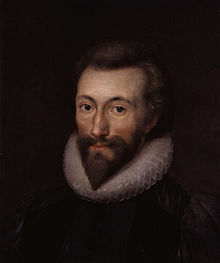
John Donne
We found 8 free papers on John Donne
Essay Examples
Overview
“A Valediction: Forbidding Mourning” by John Donne
John Donne
Sonnet 116
Throughout the old ages. worlds have rewritten what true love agencies. The modern-day significance of true love is the feeling of carefreeness that one experiences when around another human. True love in Shakespeare and Donne’s clip period. was a deep religious and emotional connexion towards two worlds. The connexion ne’er slices and grows stronger with…
Close Reading: John Donne’s “The Sun Rising” Analysis
John Donne
Busy old fool, unruly Sun, Why dost thou thus, Through windows, and through curtains, call on us? Must to thy motions lovers’ seasons run? Saucy pedantic wretch, go chide Late school-boys and sour prentices, Go tell court-huntsmen that the king will ride, Call country ants to harvest offices; Love, all alike, no season knows nor…
John Donne the Flea Analysis
John Donne
John Donne’s witty and outrageous poem “The Flea” is a classic example of the “metaphysical” school of poetry, with its argumentative tone and blend of amorous and intellectual elements. The flea, though apparently an unlikely subject for romantic poetry, had been previously used as an amorous conceit in English poetry. Robin Hamilton, in his edition…
The Good Morrow by John Donne Short Summary
John Donne
John Donne is a famous metaphysical poet. He is the founder of the metaphysical school of poetry. So he is often called the father of metaphysical poetry. He is a religious poet. He is also a great love poet. Metaphysical poetry is a type of poetry which deals with abstract or philosophical subjects. The most…
“The Good Morrow” by John Donne Analysis
John Donne
The poem “The Good Morrow” by John Donne intrigued me. I was particularly fascinated by the reference to the “Seven sleepers’ den” (Line 4) imagery, which compares the couple lying in bed. In this comparison, the poet alludes to a popular legend from the second century about seven young Christians from Ephesus who sought sanctuary…
An Analysis of The Good Morrow by John Donne
John Donne
John Donne is renowned for his metaphysical poetry, and his poem ‘The Good Morrow’ is no exception. It is a prime example of one of Donne’s metaphysical poems as it contains many of the characteristics that commonly appear in his other poems of this sort of verse, such as realistic setting, and a theme that…
Comparison Of “Death Be Not Proud” and “On My First Son”
John Donne
Literature
Poetry
Death has always been a controversial topic with two sides always battling with each other. The side that says that death is a terrible stage in life that take people that you love away. Or the side that believes that death is just a resting period between this world and the afterlife. The poems “On…
The Dampe – a critical commentary
Disease
John Donne
John Donne’s, The Dampe epitomises the curious nature of his genius in seduction, displaying a creative audacity that effectively seduces from a foundation of peculiarity. The title itself immediately creates a somewhat macabre mood; though in contemporary reading the word ‘damp’ holds little gravity in its association with moisture, its original connotations were that of…
| born | January 22, 1572, London, United Kingdom |
|---|---|
| died | March 31, 1631, London, United Kingdom |
| description | John Donne was an English poet, scholar, soldier and secretary born into a recusant family, who later became a cleric in the Church of England. Under royal patronage, he was made Dean of St Paul's Cathedral in London. He is considered the preeminent representative of the metaphysical poets. |
| books | Forbidding Mourning 1633, |
| children | Lucy Donne, George Donne, Constance Donne, Francis Donne, Mary Donne |
| quotations | Any man’s death diminishes me, for I am involved in mankind. Any therefore never send to know for whom the bell tolls; it tolls for thee. “Love built on beauty, soon as beauty, dies.” – John Donne, ‘Elegy II’. ” Death, be not proud, though some have called thee.,“Be thine own palace, or the world’s thy jail.” “No man is an island, entire of itself; every man is a piece of the continent, a part of the main. “No spring nor summer beauty hath such grace as I have seen in one autumnal face.” “I am two fools, I know |
| information | Spouse: Anne More (m. 1601–1617) Parents: Elizabeth Heywood, John Donne |

